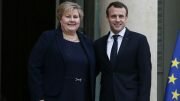Prime Minister Erna Solberg describes Monday’s meeting with her British counterpart Theresa May in New York as “constructive and positive”. Relations with the EU was a central theme.
The two prime ministers met on Monday in connection with the UN Highlevel week in the American metropolis, and the main topic of conversation was naturally relations with the EU and between their countries.
– First and foremost May confirmed that the British , like us, are keen to have good contact in the process around Brexit, said Solberg to the news agency NTB after the meeting.
Norway is a component
– We will be hands-on and be a discussion partner. Britain’s ties with Norway goes through the EU today, so we are also a kind of part of this scenario.
For us it is important to quickly negotiate agreements once they have clarified their relationship with the EU, but that clarification must be in place before they can discuss agreements with other countries, explains the prime minister.
Solberg says Britain probably wants a different solution than both the ones Norway and Switzerland have got, but the two did not go into depth about what kind of relationship this should be. She notes that the British, among other things, see problems related to free movement of workers within the internal market.
Belief in good conditions
Whatever connection the Brits end up having to EU, Solberg does not think it should be no problem for Norway to bring about good relations and bilateral solutions across the North Sea.
She cites several factors that make the relationship with Britain important. Trade between the countries is worth around 300 billion Nok a year. Britain is the third largest market for Norwegian seafood and the largest importer of Norwegian oil and gas.
– We are big on energy, and there are many Norwegian companies that have operations in the UK. That’s often where many invest in order to progress into the world, says Solberg.
Challenges
She also points out that the UK has many challenges after Brexit, when they themselves will have to handle tasks that the Union has hitherto taken care of.
– In many areas, they will probably lack the tradition and expertise in their own system, explains Solberg and cites fisheries as a sector where both Norway and the UK have extensive interests and where the British eventually have to stand on their own feet, instead of being represented by the EU.
Source: NTB scanpix / Norway Today
—————-




